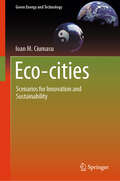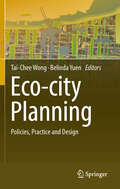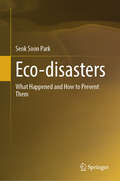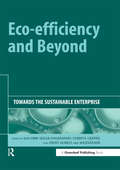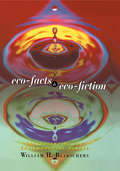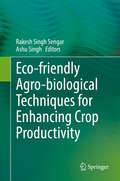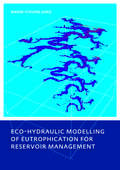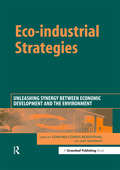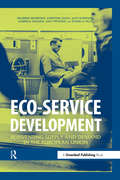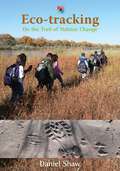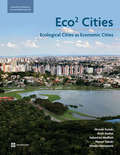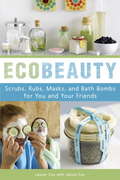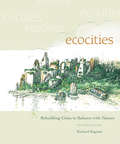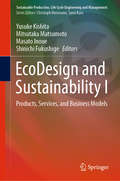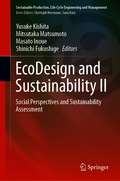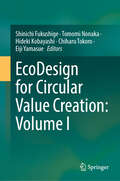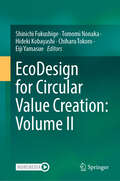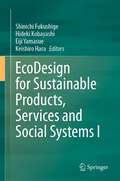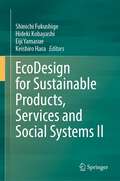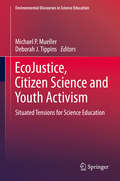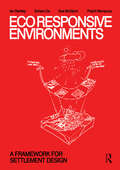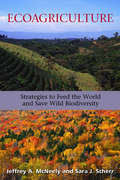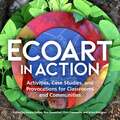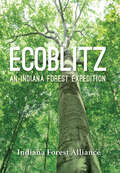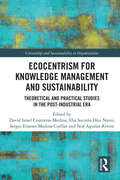- Table View
- List View
Eco-cities: Scenarios for Innovation and Sustainability (Green Energy and Technology)
by Ioan M. CiumasuThis book explores the question of how urban sustainability can be achieved despite a lack of knowledge integration between different fields. This book starts from the premise that the battle for sustainability will be won or lost in cities and proposes a critical, up-to-date review of transdisciplinary knowledge management tools – notably, scenario methods for informed decision-making. Drawing from literature and pioneering experience in innovation clusters (university-industry-government) during the last decade, it provides a review of recent eco-city concepts and knowledge management tools for effective decision-making in the transition to urban sustainability. Using method outlines, case studies, and graphical representations, it is intended to serve as a toolbox for those interested in urban transformation towards sustainability.The challenge of sustainability is unprecedented in the history of humanity. The world population is already predominantly urban, andthe biosphere is profoundly transformed in ways which we can only partially understand, let alone manage. For example, the Intergovernmental Panel for Climate Change has produced very impressive sets of global climate scenarios, but the consequences for real-world management remain marginal.This book is intended for city managers concerned with urban transformation towards sustainability, policymakers, researchers-innovators, and technology developers, industry and business professionals, as well as students and the general public.
Eco-city Planning: Policies, Practice and Design
by Belinda Yuen Tai-Chee WongEco-city planning is a key element of urban land use planning in perspective and of ongoing debate of environmental urban sustainable development with a spatial and practical dimension. The conceptual basis of ecological planning is that we can no longer afford to be merely human-centred in approach. Instead, the interdependency of human and non-human species has forced us to appreciate the 'rights' and 'intrinsic values' of non-human species in our pursuit for a sustainable ecosystem. This volume has as approach an emphasis on environmental planning policies whereby, for example, energy saving, anti-pollution measures, use of non-car modes, construction of green buildings, safeguarding of nature and natural habitats in urban areas, and use of more renewable resources are promotional norms. Their aims and leading outcome serve to protect the Earth from adverse effects of global warming and different sources of pollution threatening the quality of life of human societies.
Eco-disasters: What Happened and How to Prevent Them
by Seok Soon ParkThis book consists of 7 parts covering 42 representative environmental disasters. Part 1 introduces representative disasters in Europe, America, and Asia in the 19th century. Part 2 covers disasters related to the atmosphere. Part 3 deals with disasters caused by water and food affected by heavy metals, toxic chemicals, and pathogenic microorganisms. Part 4 examines poisoned environment caused by toxic pollutants and oil spills. Part 5 introduces nuclear power plant accidents and industrial chemical leaks. Part 6 deals with disasters occurring in the modern living environment, such as indoor air, radon, and electromagnetic radiation, and Part 7 presents cross-border disputes and planetary-wide concerns. Furthermore, this book introduces nearly all disasters that have occurred to date by adding and grouping them into similar cases alongside representative environmental disasters of each type. For example, disasters like the Exxon Valdez oil spill are detailed in parallel with similar disasters such as the Amoco Cadiz oil spill. Similarly, industrial air pollution disasters like the Meuse Valley disaster are described within the context of events like the Donora disaster. The English translation of this book, originally in Korean, was facilitated by artificial intelligence. The content was later revised by the author for accuracy.
Eco-efficiency and Beyond: Towards the Sustainable Enterprise
by Jan-Dirk Seiler-Hausmann Christa Liedtke Ernst Ulrich Von WeizsäckerBusiness-as-usual, it is widely accepted, will exceed the Earth's carrying capacity in an alarmingly short space of time. In simple terms, we need to learn to use the world's rapidly depleting resources in a significantly more efficient manner. Practical and readily adopted solutions are needed now. Eco-efficiency-or "produce more with less" – is achieved when goods and services satisfy human needs, increase the quality of life at competitive prices and when environmental impacts and resource intensity are decreased to a degree that keeps them within the limits of Earth's expected carrying capacity. Eco-efficiency – a term first proposed by the World Business Council for Sustainable Development in 1992 – is a management approach that allows businesses to carry out environmental protection measures from a market-oriented point of view, with the aim of illustrating that ecology and the economy do not need to be a contradiction. Indeed, eco-efficiency has been portrayed as a win-win-for both business and the environment. This book, which developed out of two conferences on eco-efficiency held in Düsseldorf in 1998 and 2001, is edited by Ernst Ulrich von Weizsäcker and his team from the Wuppertal Institute for Climate, Environment and Energy, one of the world's leading research programmes on resource productivity. The aim is not simply to explain the past and present of eco-efficiency but to look forward to and encourage a future where the comprehensive take-up of the concept by business, government and consumers could lead to innovation on a grand scale and the possibility of a giant leap beyond towards overall sustainability. There have been considerable achievements to date. The Dow Jones Sustainability Index, which aims to list the most sustainable corporations for investors, includes companies such as BASF, Climatex, Henkel and Matushita/Panasonic (all represented in this book), who are implementing eco-efficiency measures. A number of political initiatives have also been formed. In December 2001, the German government suggested a National Sustainability Strategy to measure Germany's sustainable development. While this not yet an accepted political target or even law, it shows that politics is moving toward binding targets for increasing efficiency. Eco-Efficiency and Beyond collects together the leading thinkers on the topic and aims to illustrate not only that the concept should be part of every business strategy but that it is a key trigger for innovation. Innovation cuts through paradoxes. It is the creation of solutions to conflicting demands. Flying in a vacuum gave us rockets and satellites; switching electrons through insulators gave us Silicon Valley and the digital age. Sustainable development presents a similar field of paradoxical innovation forces: i.e. provide affordable products and services for the growing unmet needs of the world population while reducing environmental impacts. This book is the definitive collection on eco-efficiency and will be required reading for business, government, NGOs and academicians.
Eco-facts and Eco-fiction: Understanding the Environmental Debate
by William H. BaarschersOzone-friendly, recyclable, zero-waste, elimination of toxic chemicals - such environmental ideals are believed to offer solutions to the environmental crisis. Where do these ideals come from? Is the environmental debate communicating the right problems? Eco-Facts and Eco-Fiction examines serious errors in perceptions about human and environmental health. Drawing on a wealth of everyday examples of local and global concerns, the author explains basic concepts and observations relating to the environment. Removing fear of science and technology and eliminating wrong perceptions lead to a more informed understanding of the environment as a science, a philosophy, and a lifestyle. By revealing the flaws in today's environmental vocabulary, this book stresses the urgent need for a common language in the environmental debate. Such a common language encourages the effective communication between environmental science and environmental decision-making that is essential for finding solutions to environmental problems.
Eco-friendly Agro-biological Techniques for Enhancing Crop Productivity
by Rakesh Singh Sengar Ashu SinghAs the world population is exploding and alongside fluctuations in climate is also prevalent, there is an increasing stress on the food requirements of the population. We have an urgent necessity to produce more food in the limited agricultural land. Further, to feed 7 billion people there is a requirement of high yielding crops, without harming environment and limiting the use of unnecessary pesticide and chemical fertilizers. Therefore it has become crucial to develop agri-bio-techniques which are environment friendly and also give high crop productivity. Many countries are evaluating the utility of biotechnology and its role in addressing problems of food security and poverty. Biotechnology is the application of scientific and engineering principles to the processing and production of materials by utilising biological agents. These agents are exploited to provide goods and services. Agricultural biotechnology encompasses a growing list of techniques that range from simple probes to determine a relevant gene from the complete genome to manipulating genes for a desired outcome. Many other popular methods used in the realm of agricultural technology are – gene integration, Marker-assisted breeding, Tissue culture, Gene profiling or association mapping, Metabolomics etc. The fundamental challenge facing the scientific community is how to devise innovative strategies that will bring all developed as well as developing countries into the “biological fold” and to do so in ways that will take full advantage of advances in the biological sciences to curb poverty, improve public health, and promote human development. This book contains information on eco-friendly techniques for high crop productivity and it is a myriad of different techniques and technology used to sustain productivity in crop plants. There are fewer books focusing on large-scale organic farming, molecular farming etc. Multidisciplinary research and literature is needed to deliver knowledge and products into the marketplace which fulfil these requirements. The present book is a collection of literature contributed by experts, scientists, professors, and researchers from around the world, it emphasizes work of concerned scientist and his choice of techniques used for enhancement of agricultural production. This book analyses the use of modern techniques to increase crop yields, production, and risk of hunger linked to socioeconomic scenarios.
Eco-hydraulic Modelling of Eutrophication for Reservoir Management
by Nahm-chung JungThis study presents an systematic approach to water quality assessment, hybrid modelling and decision support for eutrophication management in deep reservoirs. It is found that during the summer monsoon the catchment runoff into the Yongdam reservoir induces a transfer of pollutants from a middle stratified layer to the surface layer. Although the
Eco-industrial Strategies: Unleashing Synergy between Economic Development and the Environment
by Judy MusnikowEco-industrial development is born from the realisation that the places where we work waste too much and unnecessarily pollute the land, air and water. This book explores the key issues involved in developing eco-parks and identifies the stakeholders and their roles in such projects.
Eco-service Development: Reinventing Supply and Demand in the European Union
by Siegfried Behrendt Christine Jasch Jaap Kortman Gabriele Hrauda Ralf Pfitzner Daniela VelteSustainable development will not be possible without fundamental improvements in resource productivity and energy efficiency, the adaptation of material flows into natural cycles as well as a radical change in production and consumption patterns. In essence, what is required is not only an ecological approach to product design but also new marketing and consumption patterns for products that can satisfy our needs in a more environmentally sound way.In recent years there has been growing interest in the possibilities of eco-services to achieve some of these aims. Ecologically oriented leasing, renting, pooling and sharing, where the emphasis is placed on the sale of a product's use rather than on the product itself, offer great possibilities for innovation and environmental impact reduction. At the same time, there are opportunities to create new commercial enterprises, produce added value to production and distribution functions, and therefore create jobs. Up until now, however, there has been little research about the state of the art in eco-services, how new services can be developed, what the attitudes of consumers are to services rather than products and what the consequences of such a structural adjustment would be for firms. Eco-service Development addresses this lack of research, first by providing a comprehensive inventory and analysis of current eco-services in four European countries: Germany, Austria, the Netherlands and Spain. It then systematically explores the options open to market participants, the potential for environmental impact reduction, potential barriers to eco-services (such as consumer and producer resistance) and, finally, with what political and legal instruments ecologically oriented services can best be promoted. The book analyzes eight consumer sectors – washing, cleaning, cooking, entertainment, gardening, do-it-yourself, mobility and leisure time – from the point of view of both supply and demand and highlights the optimization potential and development perspectives for commercial new use eco-service concepts. This book is the most comprehensive analysis yet published of how eco-services are being implemented and how they could best be encouraged and contains valuable lessons for policy-makers, interested businesses and all those in the academic community searching for ways to dematerialize the economy.
Eco-tracking: On the Trail of Habitat Change (Barbara Guth Worlds of Wonder Science Series for Young Readers)
by Daniel ShawIn this much-needed work for our nation's youth, Daniel Shaw tracks the interconnections of small regional ecosystems to larger ones, and in the process demonstrates the accessibility of nature to everyone. As Shaw notes in his introduction, the story that is too often told about the environment is one about despair and destruction, which basically suggests to young people that all is lost and everything was better before their time. Instead, this book tells true life success stories of young people involved in citizen science efforts and how others can join in tracking climate change, local wildlife, and other parts of the natural world. Shaw's work demonstrates by example a story of hope for a natural environment that exists in the world. At the core of this book is the notion that humans are components of their ecosystems. Shaw encourages readers to learn what becomes of their outputs and to understand human contributions to various ecological cycles. Sidebars and activities give readers a chance to discover these cycles right in their backyards and to link their discoveries to neighborhood environments.
Eco2 Cities: Ecological Cities as Economic Cities
by Sebastian Moffatt Hinako Maruyama Hiroaki Suzuki Arish Dastur Nanae YabukiThe Eco2 Cities approach is a point of departure for cities that would like to reap the many benefits of ecological and economic sustainability. It provides an analytical and operational framework that offers strategic guidance to cities on sustainable and integrated urban development. At the same time case studies are used throughout the book to provide a matter-of-fact and ground-level perspective. The Eco2 framework is flexible and easily customized to the context of each country or city. Based on the particular circumstances and the development priorities of a city - the application of the framework can contribute to the development of a unique action plan or roadmap in each case. This action plan can be triggered through catalyst projects. To support this framework, the book also begins to introduce some powerful and practical methods and tools that can further enable sustainable and integrated city planning and decision making. These include 1) operational and process methods that can strengthen collaborative decision making and cross-sector synergies in a city; 2) analytical methods ranging from diagnostics, simulation, design and scenario-generation; and 3) accounting and benchmarking methods which can help clarify, define and measure what it means to truly invest in sustainability and resilience. As additional reference reading, the book also features a series of case studies from best practice cities around the world, each demonstrating a very different dimension of the Eco2 approach. It also features a series of infrastructure sector notes (on spatial development, transport, energy, water and waste management), each of which explore sector specific issues as they pertain to urban development, and the many opportunities for coordination and integration across sectors.
EcoBeauty
by Janice Cox Lauren CoxEcoBeauty has something for everyone. Crafty types will love the gift ideas, and even those of us who can barely make toast will be able to handle these recipes. Making beauty products at home is a great way to save money and help the environment, and these recipes will do all that plus give you gorgeous skin and hair. --Beth Mayall-Traglia, editor in chief of TotalBeauty.comFun, fresh bath and body recipes that are great for gifts, girls' nights, or everyday use!--Jill and Megan Carle, coauthors of Teens Cook and College CookingAttention DIYers! Finally, the ultimate natural-beauty "cookbook" packed with deliciously easy, eco-friendly recipes for getting gorgeous with fresh ingredients from the kitchen. A must-have for anyone who wants to be healthy, save money, and make the world a more eco-beautiful place.--Rona Berg, editor in chief of Organic Beauty magazine and author of Fast BeautyLotions and Toners and Soaps, Oh My!What's the hippest way to be green? When you whip up a batch of Avocado Hair Conditioner, not only will your hair be green (for about twenty minutes) but your lifestyle will, too. Natural beauty maven Lauren Cox is bringing bath and body into the eco-friendly future with 100 easy and economical projects, featuring au courant ingredients--hemp oil, green tea, soy milk, powdered kelp, goat's milk, and more--that are increasingly easy to find. Recycled bottling and green gift-giving ideas round out this stylish how-to manual for the DIY generation. So whether you are a crafty chica revitalizing your skin with an Espresso Yourself Facial Mask, a penny-pinching diva rocking some simple Green Tea Toner, or a chocoholic with a craving for Chocolate Brownie Lip Gloss, EcoBeauty has a money-saving, planet-loving, skin-pleasing creation for you.From the Trade Paperback edition.
EcoCities
by Richard RegisterMost of the world's population now lives in cities. So if we are to address the problems of environmental deterioration and peak oil adequately, the city has to be a major focus of attention.Ecocities is about re-building cities and towns based on ecological principles for the long term sustainability, cultural vitality and health of the Earth's biosphere. Unique in the literature is the book's insight that the form of the city really matters - and that it is within our ability to change it, and crucial that we do. Further, that the ecocity within its bioregion is comprehensible and do-able, and can produce a healthy and potentially happy future.Ecocities describes the place of the city in evolution, nature and history. It pays special attention to the key question of accessibility and transportation, and outlines design principles for the ecocity. The reader is encouraged to plunge in to its economics and politics: the kinds of businesses, planning and leadership required. The book then outlines the tools by which a gradual transition to the ecocity could be accomplished. Throughout, this new edition is generously illustrated with the author's own inspired visions of what such rebuilt cities might actually look like.Richard Register is one of the world's great theorists and authors in ecological city design and planning. The founder of Urban Ecology and Ecocity Builders, he convened the first International Ecocity Conference in 1990, lectures around the world, and has authored two previous books, as well as an earlier edition of Ecocities.
EcoDesign and Sustainability I: Products, Services, and Business Models (Sustainable Production, Life Cycle Engineering and Management)
by Mitsutaka Matsumoto Shinichi Fukushige Yusuke Kishita Masato InoueThis book highlights cutting-edge ecodesign research, covering product and service design, smart manufacturing, and social perspectives in ecodesign. Featuring selected papers presented at EcoDesign 2019: 11th International Symposium on Environmentally Conscious Design and Inverse Manufacturing, it also includes diverse, interdisciplinary approaches to foster ecodesign research and activities. In the context of Sustainable Development Goals (SDGs), it addresses the need for the manufacturing industry to design innovations for sustainable value creation, taking into account technological developments, legislation, and consumer lifestyles. Further, the book discusses the concept of circular economy, which originated in Europe and aims to increase resource efficiency by shifting away from the linear economy. Focusing on product life cycle design and management, smart manufacturing, circular economy, and business strategies, and providing useful approaches and solutions to these emerging concepts, this book is intended for both researchers and practitioners working in the broad field of ecodesign and sustainability.
EcoDesign and Sustainability II: Social Perspectives and Sustainability Assessment (Sustainable Production, Life Cycle Engineering and Management)
by Mitsutaka Matsumoto Shinichi Fukushige Yusuke Kishita Masato InoueThis book highlights cutting-edge ecodesign research, covering product and service design, smart manufacturing, and social perspectives in ecodesign. Featuring selected papers presented at EcoDesign 2019: 11th International Symposium on Environmentally Conscious Design and Inverse Manufacturing, it also includes diverse, interdisciplinary approaches to foster ecodesign research and activities. In the context of Sustainable Development Goals (SDGs), it addresses the need for the manufacturing industry to design innovations for sustainable value creation, taking into account technological developments, legislation, and consumer lifestyles. Further, the book discusses the concept of circular economy, which originated in Europe and aims to increase resource efficiency by shifting away from the linear economy.Focusing on product life cycle design and management, smart manufacturing, circular economy, and business strategies, and providing useful approaches and solutions to these emerging concepts, this book is intended for both researchers and practitioners working in the broad field of ecodesign and sustainability.
EcoDesign for Circular Value Creation: Volume I
by Shinichi Fukushige Tomomi Nonaka Hideki Kobayashi Eiji Yamasue Chiharu TokoroThis 2-volume book sheds new light on the forefront of ecodesign research, encompassing product and service design, smart manufacturing, and social perspectives. Featuring selected papers from EcoDesign 2023: 13th International Symposium on Environmentally Conscious Design and Inverse Manufacturing, it offers interdisciplinary approaches to foster sustainable innovations. Within the framework of the Sustainable Development Goals (SDGs), it underscores the necessity for the manufacturing sector to innovate for sustainable value creation, taking into account technological advancements, regulatory requirements, and consumer behavior. Additionally, it explores the concept of the circular economy, which originated in Europe and seeks to enhance resource efficiency by transitioning from a linear to a circular economic model. This book aims to unite professionals across the globe who are dedicated to advancing the field of ecodesign, and facilitating the exchange of knowledge across various disciplines and communities. The first volume highlights the product life cycle design and management, sustainability assessment for ecoDesign, and circular economy. Readers will delve into the environmentally conscious design of products and services, life cycle management, sustainable manufacturing, EoL management and process technologies, green supply chain management, life cycle evaluation, and sustainability indices. Contributions from renowned scholars provide critical insights into ecodesign regulations compliance processes like EPD certifications; consumer behavior towards eco-labels; innovative business models for sustainability; participatory approaches for ESG initiatives; digital twins for real-time life cycle assessment; AI techniques supporting wastewater treatment; among others.
EcoDesign for Circular Value Creation: Volume II
by Shinichi Fukushige Tomomi Nonaka Hideki Kobayashi Eiji Yamasue Chiharu TokoroThis 2-volume book highlights cutting-edge ecodesign research, encompassing product and service design, smart manufacturing, and social perspectives. Featuring selected papers from EcoDesign 2023: 13th International Symposium on Environmentally Conscious Design and Inverse Manufacturing, it offers interdisciplinary approaches to foster sustainable innovations. Within the framework of the Sustainable Development Goals (SDGs), it underscores the necessity for the manufacturing sector to innovate for sustainable value creation, taking into account technological advancements, regulatory requirements, and consumer behavior. Additionally, it explores the concept of the circular economy, which originated in Europe and seeks to enhance resource efficiency by transitioning from a linear to a circular economic model. This book aims to unite professionals across the globe who are dedicated to advancing the field of ecodesign, and facilitating the exchange of knowledge across various disciplines and communities. The second volume highlights sustainable technology, social perspectives in ecodesign, and business strategy. The chapters cover digital and AI technologies for sustainability, sustainable social infrastructure, smart manufacturing, sustainable consumption and production, policy, legislation and social activities, finance and investment for sustainability, green business, and engineering economics. Readers will discover diverse perspectives from expert contributors who delve into critical issues like climate change education in primary schools in Vietnam; food security in Japan; repurposing lithium-ion batteries; carbon neutrality through sensor-based smart city services; life cycle assessments of automotive parts; human health risks from chemicals in export products; and developing high-resolution spatial global biodiversity damage factors. This collection invites readers to think through critical questions about resource efficiency and the shift from a linear to a circular economy. Researchers in the fields of sustainable design, environmental engineering, policy-making, and business strategy will find this book invaluable.
EcoDesign for Sustainable Products, Services and Social Systems I
by Shinichi Fukushige Hideki Kobayashi Eiji Yamasue Keishiro HaraThis 2-volume book highlights cutting-edge ecodesign research and covers broad areas ranging from individual product and service design to social system design. It includes business and policy design, circular production, life cycle design and management, digitalization for sustainable manufacturing, user behavior and health, ecodesign of social infrastructure, sustainability education, sustainability indicators, and energy system design. Featuring selected papers presented at EcoDesign 2021: 12th International Symposium on Environmentally Conscious Design and Inverse Manufacturing, it also includes diverse, interdisciplinary approaches to foster ecodesign research and activities. In the context of Sustainable Development Goals (SDGs), in particular SDG 12 (Responsible Consumption and Production), it addresses design innovations for sustainable value creation, considering technological developments, legislation, and consumer lifestyles. Further, the book discusses the concept of circular economy, which aims to develop circular business models for resource efficient society by taking advantage of digital technologies including artificial intelligence, internet of things, digital twin, data analysis and simulation. Written by experts from academia and industry, Volume 1 highlights sustainable design such as product and process design, collaborative design, sustainable innovation, digital technologies, design methodology for sustainability, and energy system design. The methods, tools, and practices described are useful for readers to facilitate value creation for sustainability.
EcoDesign for Sustainable Products, Services and Social Systems II
by Shinichi Fukushige Hideki Kobayashi Eiji Yamasue Keishiro HaraThis 2-volume book highlights cutting-edge ecodesign research and covers broad areas ranging from individual product and service design to social system design. It includes business and policy design, circular production, life cycle design and management, digitalization for sustainable manufacturing, user behavior and health, ecodesign of social infrastructure, sustainability education, sustainability indicators, and energy system design. Featuring selected papers presented at EcoDesign 2021: 12th International Symposium on Environmentally Conscious Design and Inverse Manufacturing, it also includes diverse, interdisciplinary approaches to foster ecodesign research and activities. In the context of Sustainable Development Goals (SDGs), in particular SDG 12 (Responsible Consumption and Production), it addresses design innovations for sustainable value creation, considering technological developments, legislation, and consumer lifestyles. Further, the book discusses the conceptof circular economy, which aims to develop circular business models for resource efficient society by taking advantage of digital technologies including artificial intelligence, internet of things, digital twin, data analysis and simulation. Written by experts from academia and industry, Volume 2 focuses on the sustainability assessment of product lifecycle, waste management, material circularity and energy efficiency, food and agriculture, user behavior and health, and transportation. The methods, tools, and practices described are useful for readers to facilitate value creation for sustainability.
EcoJustice, Citizen Science and Youth Activism
by Michael P. Mueller Deborah J. TippinsThis volume draws on the ecojustice, citizen science and youth activism literature base in science education and applies the ideas to situated tensions as they are either analyzed theoretically or praxiologically within science education pedagogy. It uses ecojustice to evaluate the holistic connections between cultural and natural systems, environmentalism, sustainability and Earth-friendly marketing trends, and introduces citizen science and youth activism as two of the pedagogical ways ecojustice philosophy can be enacted. It also comprises evidence-based practice with international service, community embedded curriculum, teacher preparation, citizen monitoring and community activism, student-scientist partnerships, socioscientific issues, and new avenues for educational research.
EcoResponsive Environments: A Framework for Settlement Design
by Ian Bentley Sue McGlynn Soham De Prachi RampuriaEcoResponsive Environments integrates our current knowledge of designing for human needs, with a deeper understanding of natural systems. The book offers both a call to action and a comprehensive yet pragmatic framework for practising the art and science of settlement design, called EcoResponsive Design.Bridging the gap between theory and generic policy on the one hand, and design for specific places and sites on the other, the book is aimed not only at the professionals involved in planning, designing and developing these places, but also the wider range of communities interested in creating better spaces for our everyday lives.EcoResponsive Design encompasses all scales, ranging from the overall form of settlements and the landscapes in which they sit, to buildings and the detailed design of public spaces. Drawing from projects, places and best practices in many different countries and contexts across the world, it demonstrates how positive changes at the local scale can be achieved for every single site, large or small. The book urges a shift in focus from individual specialisms to collaborative actions, enabling development stakeholders to negotiate a balance between short-term financial viability and longer-term environmental and social values.
Ecoagriculture: Strategies to Feed the World and Save Wild Biodiversity
by Jeffrey A. Mcneely Future Harvest Sara J. ScherrAlthough food-production systems for the world's rural poor typically have had devastating effects on the planet's wealth of genes, species, and ecosystems, that need not be the case in the future. In Ecoagriculture, two of the world's leading experts on conservation and development examine the idea that agricultural landscapes can be designed more creatively to take the needs of human populations into account while also protecting, or even enhancing, biodiversity. They present a thorough overview of the innovative concept of "ecoagriculture" - the management of landscapes for both the production of food and the conservation of wild biodiversity. The book:examines the global impact of agriculture on wild biodiversitydescribes the challenge of reconciling biodiversity conservation and agricultural goalsoutlines and discusses the ecoagriculture approachpresents diverse case studies that illustrate key strategiesexplores how policies, markets, and institutions can be re-shaped to support ecoagricultureWhile focusing on tropical regions of the developing world -- where increased agricultural productivity is most vital for food security, poverty reduction, and sustainable development, and where so much of the world's wild biodiversity is threatened -- it also draws on lessons learned in developed countries. Dozens of examples from around the world present proven strategies for small-scale, low-income farmers involved in commercial production.Ecoagriculture explores new approaches to agricultural production that complement natural environments, enhance ecosystem function, and improve rural livelihoods. It features a wealth of real-world case studies that demonstrate the applicability of the ideas discussed and how the principles can be applied, and is an important new work for policymakers, students, researchers, and anyone concerned with conserving biodiversity while sustaining human populations.
Ecoart in Action: Activities, Case Studies, and Provocations for Classrooms and Communities
by Amara Geffen, Ann Rosenthal, Chris Fremantle, and Aviva RahmaniReady-to-go, vetted approaches for facilitating artistic environmental projectsHow do we educate those who feel an urgency to address our environmental and social challenges? What ethical concerns do art-makers face who are committed to a deep green agenda? How can we refocus education to emphasize integrative thinking and inspire hope? What role might art play in actualizing environmental resilience?Compiled from 67 members of the Ecoart Network, a group of more than 200 internationally established practitioners, Ecoart in Action stands as a field guide that offers practical solutions to critical environmental challenges. Organized into three sections—Activities, Case Studies, and Provocations—each contribution provides models for ecoart practice that are adaptable for use within a variety of classrooms, communities, and contexts. Educators developing project and place-based learning curricula, citizens, policymakers, scientists, land managers, and those who work with communities (human and other) will find inspiration for integrating art, science, and community-engaged practices into on-the-ground environmental projects. If you share a concern for the environmental crisis and believe art can provide new options, this book is for you!
Ecoblitz: An Indiana Forest Expedition
by Indiana Forest AllianceA short hike through an Indiana forest reveals layers of living things: the overstories and understories of trees, the shadow of a mammal, colorful fungi. But what would it mean to methodically document the communities of plants and animals harboring in Indiana's public forests, at humid midnight or coldest dawn? What is the impact of this wondrous knowledge?Ecoblitz describes the findings of, and the dogged scientists behind, the Indiana Forest Alliance's multiyear forest wildlife census. Scientists' journeys in pursuit of elusive bats, lavish lichen, and spider species paint a breathtaking picture of Indiana's biodiversity and its value to Indiana's policy, polity, and poetics. This book will amaze readers with a dazzling portrait of local biodiversity, deepen appreciation for Indiana's eastern hardwood forest system, and inspire a desire to advocate for it. Ecoblitz is a book for lovers of nature, for those who appreciate science but are not scientists themselves, and for those who want to learn something new.
Ecocentrism for Knowledge Management and Sustainability: Theoretical and Practical Studies in the Post-industrial Era (Citizenship and Sustainability in Organizations)
by Elia Socorro Díaz Nieto Noé Aguilar-Rivera David Israel Contreras-Medina Sergio Ernesto Medina-CuéllarThrough theoretical-practical studies, this book explains the foundational concepts of ecocentrism, knowledge management, and sustainability and advances the understanding of how ecocentric paradigms can be leveraged for the process of knowledge management and knowledge creation, showcasing various applications of this practice and illustrating advantages and disadvantages of adopting an eco-centric approach. With a focus on the three themes of sustainability, knowledge management, and ecocentrism, this edited volume presents practical case studies from various organizational contexts, illustrating how sustainability-related practices make use of knowledge management to meet their business objectives from an ecocentric perspective and highlighting the transversal application of this approach to various types of contexts. The book also addresses cases of how post-industrial organizations of the 21st century are using knowledge management in advancing the Sustainable Development Goals with reflections on ecocentrism. There is practical, theoretical, and methodological content, making this valuable to researchers, academics, and advanced students in the fields of knowledge management, sustainability, organizational studies and strategic management.
